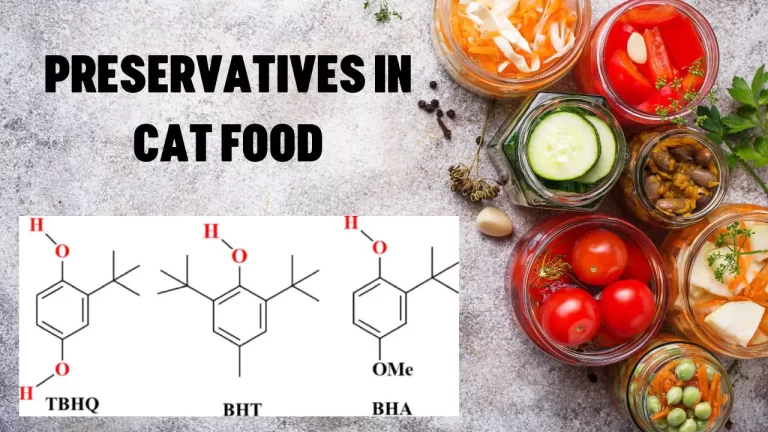Food preservation requires preservatives. Some of those used in commercial cat food may harm cats.
This article will discuss cat food preservatives, synthetic vs. natural preservatives, preservatives to avoid, and how to detox your cat.
Understanding the Concerns about Preservatives in Cat Food
Preservatives might be synthetic or natural. To prevent bacteria, fungus, and mold development in food, synthetic preservatives are added. Antimicrobial and antioxidant natural preservatives come from plants or animals.
Cat food with synthetic preservatives may pose health risks:
- They may induce dermatological, intestinal, or allergic symptoms in cats.
- They may interfere with vitamin and mineral metabolism, causing nutritional shortages or imbalances.
- They may build in the body and harm organs, particularly the liver and kidneys.
- They might cause cancer.
Some of the controversial preservatives in commercial cat food are:
- Ethoxyquin: This synthetic antioxidant prevents fat and oil rancidity. Pesticides and rubber stabilizers utilize it. In animals, it causes liver damage, skin issues, immune system diseases, and cancer.
- Butylated hydroxyanisole (BHA) and butylated hydroxytoluene (BHT): Synthetic antioxidants BHA and BHT inhibit fat and oil oxidation. Cosmetics, drugs, and rubber utilize them. They induce liver, renal, and cancer in animals.
- Propyl gallate: This synthetic antioxidant prevents fat and oil oxidation. Cosmetics, drugs, and adhesives utilize it. It may cause liver damage and cancer in animals.
- Sodium nitrite: This synthetic preservative prevents bacterial development and colors meat pink. Fertilizers, explosives, and dyes utilize it. It may produce carcinogenic nitrosamines with other dietary ingredients.
Synthetic vs Natural Preservatives in Cat Food
Synthetic preservatives have some advantages over natural preservatives in cat food. They are:
- More effective at preventing spoilage and extending shelf life
- More stable and consistent in quality
- Cheaper and more readily available
However, synthetic preservatives also have some disadvantages compared to natural preservatives in cat food. They are:
- More likely to cause adverse reactions or health problems in cats
- More difficult to eliminate from the body
- More harmful to the environment
Natural preservatives have some benefits over synthetic preservatives in cat food. They are:
- Safer and more compatible with cats’ physiology
- Easier to metabolize and excrete from the body
- More eco-friendly and sustainable
However, natural preservatives also have some drawbacks compared to synthetic preservatives in cat food. They are:
- Less effective at preventing spoilage and extending shelf life
- Less stable and consistent in quality
- More expensive and less available
Natural cat food preservatives include:
- Vitamin E: Vegetable oils, nuts, seeds, and leafy greens contain this natural antioxidant. It prevents oil and fat oxidation. It boosts immunity and skin health.
- Vitamin C: Fruits, vegetables, and plants contain this antioxidant. It prevents germs and fat and oil oxidation. It aids the immune system and wound healing.
- Rosemary extract: A natural antioxidant from rosemary plants. It’s antibacterial and prevents fat oxidation. It’s anti-inflammatory and anti-cancer.
- Mixed tocopherols: Vegetable oil-derived mixed tocopherols are antioxidants. They operate synergistically to prevent fat and oil oxidation.
Preservatives to Avoid in Cat Food
Avoid cat food with artificial preservatives, colors, or tastes. These substances may hurt your cat and hide food quality and freshness. Avoid cat food preservatives like:
- Butylated hydroxyanisole (BHA): BHA, a synthetic antioxidant, prevents fat and oil oxidation. It causes animal liver, kidney, and cancer.
- Carrageenan: Seaweed-derived carrageenan thickens. It makes wet cat food moister. In animals, it causes inflammation, ulceration, and digestive tract cancer.
- Sodium nitrite: This synthetic preservative prevents bacterial development and colors meat pink. It may produce carcinogenic nitrosamines with other dietary ingredients.
- Ethoxyquin: This synthetic antioxidant prevents fat and oil rancidity. In animals, it causes liver damage, skin issues, immune system diseases, and cancer.
- Red, yellow, and blue food coloring: Cat food is colored with artificial hues including red, yellow, and blue. They are nutritionally worthless and may induce animal allergies, behavioral issues, and cancer.
Detoxing Preservatives in Cat Food
To detox your cat from preservatives in cat food, modify its diet and lifestyle. Preservative-free cat food and better diets:
- Check labels for cat food with natural or no preservatives. Avoid cat food with synthetic preservatives, colors, and tastes.
- Choose fresh, healthy, and lightly processed cat food. Avoid cat food with by-products, fillers, or additives.
- Cat food should match your cat’s age, size, activity level, and health. Ask your vet.
- Gradually switch your cat’s food and see its reaction. Over many days or weeks, gradually add a little bit of the new food to the old meal. Watch for digestive issues such as vomiting, diarrhea, or lack of appetite. Stop the transfer and visit your vet if your cat reacts negatively.
- Give your cat fresh water, probiotics, antioxidants, and omega-3 fatty acids. These chemicals aid digestion, immunity, detoxification, and inflammation.
- Clean and stress-free surroundings for your cat. Clean your cat’s litter box, give toys and scratching posts, and avoid loud sounds and unexpected people and animals. Stress weakens your cat’s immune system and makes it more toxic.
Conclusion
Food preservation requires preservatives. Synthetic or natural, each has perks and downsides.
Preservatives may cause allergic responses, organ damage, or cancer in cats. Avoid cat food with synthetic preservatives, colors, or tastes.
Instead, pick cat food with natural preservatives or no preservatives and high-quality, fresh, healthy, and minimally processed ingredients.
To detox your cat from preservatives in cat food, gradually change its diet and add fresh water, probiotics, antioxidants, and omega-3 fatty acids. Cats require a clean, stress-free home. These tips might help your cat live longer and happier.







